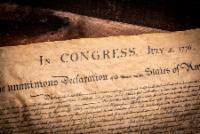By: Lisanne L. Mikula, Esquire
Now that the 4th of July fireworks have faded and the last of the leftover potato salad has vanished from the fridge, it’s time to think about whether we are celebrating the correct date as Independence Day.
Although we mark July 4, 1776 as the date the United States became an independent nation, it was actually on July 2, 1776 that the Second Continental Congress voted to declare independence, passing a resolution stating, “That these United Colonies are, and of right ought to be, free and independent States, that they are absolved from all allegiance to the British Crown, and that all political connection between them and the State of Great Britain is, and ought to be, totally dissolved.” From a legal perspective, therefore, July 2nd is really our nation’s birthday.
It took two more days, however, to agree on the final language of the Declaration of Independence. This means that our nationally recognized Independence Day—July 4th—is essentially the date in 1776 when Congress acknowledged that Thomas Jefferson did, indeed, have a certain way with words. From a literary perspective, July 4th is Independence Day.
But, much like the conundrum of “does a tree falling in the forest make a sound if no one is there to hear it?”, can it be said that the nation had truly declared independence if its populace had not yet learned of it? Although Philadelphia printer John Dunlop delivered single-page broadsheets bearing the text of the Declaration of Independence to John Hancock on July 5, 1776 for dispatch to General George Washington at his encampment in New York, to the thirteen former colonies—now states—and to the British government, it took days for the broadsheets to reach their destinations, and news of independence slowly circulated during the upcoming weeks.
The residents of Philadelphia, however, were more fortunate. Benjamin Towne, an Englishman who had settled in Philadelphia, was the publisher of The Pennsylvania Evening Post, the city’s first tri-weekly paper, and the only evening newspaper. It was perhaps because of the then-unheard of frequency of The Pennsylvania Evening Post’s distribution that Towne got the scoop of a lifetime—on July 6, 1776, The Pennsylvania Evening Post became the first newspaper in the newly minted nation to print the full text of the Declaration of Independence.[1]
Arguably, it is only when the Declaration of Independence made its way into the hands of the citizenry on July 6, 1776, that our nation was truly formed. The Continental Congress’ proclamation that the people of this nation have “certain unalienable Rights, that among these are Life, Liberty and the pursuit of Happiness” would have been meaningless had the people been left unaware of their rights and deprived of the ability to define those rights and the means by which those rights are to be protected.
We hope you had a happy 4th (or 2nd) of July. For me, I’ll take the 6th.
The Law Firm of DiOrio & Sereni, LLP is a full-service law firm in Media, Delaware County, Pennsylvania. We strive to help people, businesses and institutions throughout Southeastern Pennsylvania solve legal problems – and even prevent legal problems before they occur. To learn more about the full range of our specific practice areas, please visit www.dioriosereni.com or contact Lisanne L. Mikula, Esquire at 610-565-5700 or at [email protected]
[1] This by no means renders Towne a patriot. Ever the opportunist, Towne’s loyalties fluctuated depending on how the war was progressing. When the British occupied Philadelphia on September 26, 1776, he became a Royalist in time for his next publication. When the British evacuated the city seven months later, Towne reverted to the patriot viewpoint. In 1778, when the city’s military fortunes again shifted, Towne began publishing The Royal Pennsylvania Gazette. As the other regional newspapers either evacuated or suspended publication, Towne’s shifting loyalties allowed him to remain the sole newspaper publisher in Philadelphia. Nonetheless, his opportunism marked him as disloyal, and he was “attainted” for treason in 1778. Although the charges were later dropped, he was unable to establish a lasting successful publication.
Like what you see? Join our mailing list













